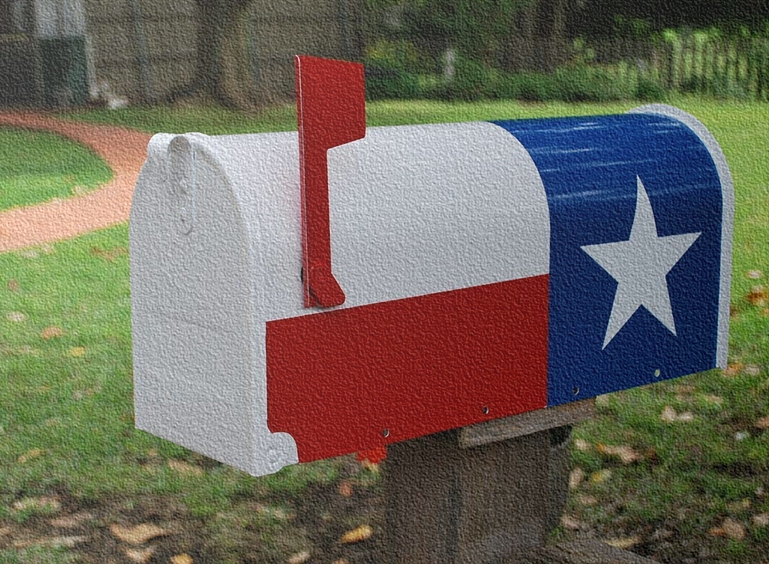Should Texans Who Fear COVID-19 Qualify For Mail-In Ballots?
 A recent preliminary injunction issued by a Federal Judge in Travis County to allow mail-in voting for all Texas voters who fear COVID-19 is part of an ongoing legal dispute between the Democrat Party of Texas and Republican Attorney General Ken Paxton. Democrats argue that the Texas election code can be interpreted to allow citizens who fear their health is in danger as a result of COVID-19 to qualify for absentee voting, and that doing so will greatly increase voter turnout. Paxton argues this is an incorrect interpretation of the law and that greatly expanding absentee voting will facilitate election fraud. This case is important because it will affect upcoming elections and set precedent for voting laws that could lead to further implications down the road.
A recent preliminary injunction issued by a Federal Judge in Travis County to allow mail-in voting for all Texas voters who fear COVID-19 is part of an ongoing legal dispute between the Democrat Party of Texas and Republican Attorney General Ken Paxton. Democrats argue that the Texas election code can be interpreted to allow citizens who fear their health is in danger as a result of COVID-19 to qualify for absentee voting, and that doing so will greatly increase voter turnout. Paxton argues this is an incorrect interpretation of the law and that greatly expanding absentee voting will facilitate election fraud. This case is important because it will affect upcoming elections and set precedent for voting laws that could lead to further implications down the road.
In March, the Democrat party of Texas filed suit against the Texas secretary of state and Travis County Clerk demanding a judgment to allow Texans who believe their health is in danger due to COVID-19, which could basically include anyone, to vote by mail.
According to the Texas Secretary of State’s website, under current law, to be eligible to vote by mail in Texas, you must:
- be 65 years or older;
- be disabled;
- be out of the county on election day and during the period for early voting by personal appearance; or
- be confined in jail, but otherwise eligible.
“Current law says you can vote-by-mail if you are disabled and we believe COVID-19 puts the health of all of us at risk,” said Texas Democratic Party Chair Gilberto Hinojosa.
Democrat plaintiffs argue that government recommended social distancing measures and fear of getting sick will lead to a decrease in voter turnout in the upcoming elections. Their legal arguments hinge around the definition of “disability” in the Texas election code:
“Sec. 82.002. DISABILITY. (a) A qualified voter is eligible for early voting by mail if the voter has a sickness or physical condition that prevents the voter from appearing at the polling place on election day without a likelihood of needing personal assistance or of injuring the voter's health.
On April 14th, the Office of Texas Attorney General Ken Paxton released an “informal letter of legal advice” saying that fear of COVID-19 is not a valid reason for Texans to qualify for mail-in voting.
“We conclude that, based on the plain language of the relevant statutory text, fear of contracting COVID-19 unaccompanied by a qualifying sickness or physical condition does not constitute a disability under the Election Code for purposes of receiving a ballot by mail,” the letter said.
The letter also said that those who advise voters to apply for mail-in ballots based on fear of COVID-19 could be subjected to criminal sanctions.
“To the extent third parties advise voters to apply for a mail-in ballot based solely on fear of contracting COVID-19, such activity could subject those third parties to criminal sanctions imposed by Election Code section 84.0041.”
On April 17th, Judge Tim Sulak of the 353rd District Court in Travis County issued a preliminary injunction to include fear of COVID-19 under the definition of “disability,” in the Texas Election Code and ordered election officials not to reject any mail ballot applications received from registered voters who use the disability category of eligibility as a result of COVID-19 for the reason that the applications were submitted based on the disability category.
“The evidence shows that voters and these Plaintiffs … are reasonable that voting in person while the virus that causes COVID-19 is still in general circulation presents a likelihood of injuring their health, and any voters without established immunity meet the plain language definition of disability thereby entitling them to a mailed ballot under Tex. Elec. Code 82.002,” Sulak said.
Shortly after Sulak issued his preliminary injunction, Paxton filed an appeal, saying Sulak’s order would increase fraud and threaten election security, while making clear that he was going to fight it in the state courts.
“This unlawful expansion of mail-in voting will only serve to undermine the security and integrity of our elections and to facilitate fraud. Mail ballots based on disability are specifically reserved for those who are legitimately ill and cannot vote in-person without needing assistance or jeopardizing their health. Fear of contracting COVID-19 does not amount to a sickness or physical condition as required by state law. My office will continue to defend Texas’s election laws to ensure that our elections are fair and our democratic process is lawfully maintained,” Paxton said.
The legal question of whether Sulak’s injunction to allow all Texas voters who fear COVID-19 to vote by mail will be determined by the federal courts in the coming weeks and will certainly impact the July 14 runoff elections, and potentially the November general elections as well.
If Texas is still on lockdown in July, allowing wider spread absentee voting would probably increase voter turnout, which in theory would be good for Democracy. It could also help prevent the spread of the virus if we haven’t all already had it by then. Several states, like Colorado, Hawaii, Oregon, Utah, and Washington conduct all elections by mail, and other states like California allow counties to decide whether or not to conduct elections by mail.
However, it is unlikely Texas will need to be on lockdown in July, and Texans aged 65 and older who are considered the most vulnerable to COVID-19 already qualify to vote by mail.
Furthermore, interpreting the law now to allow fear of COVID-19 qualify voters as “disabled” could set a volatile precedent that could affect voting and other Texas laws down the road. Would fear of the common flu qualify Texans as “disabled” under voting laws? Could this allow them to qualify for other public disability benefits?
Absentee voting also has a higher potential for voting fraud than booth voting, and there are documented cases of it in Texas. A significant increase in mail-in voting will likely lead to an increase in voter fraud, which would be bad for democracy. The democratic process, and the American peoples’ faith in that process is part of what holds on country together. If we lose that, then coronavirus could become the least of our problems.
The Texas Attorney General’s website explains mail ballot fraud: “This activity is also known as vote harvesting. Vote harvesting exploits the inherent insecurities of the mail ballot system in two phases: seeding and harvesting. In the seeding phase, applications for mail ballots are generated to saturate targeted precincts with mail ballots. Commonly used schemes involve gaining voters’ signatures by deception, intimidation, or forgery; and/or fraudulently making an application for a voter who is not qualified to vote by mail, often by claiming that an able-bodied person is disabled. In the harvesting phase, workers target voters as they receive their ballots in the mail and obtain votes for the candidates they support, either by intimidation, deception, compensation, influence, or outright theft of the ballot itself.”








